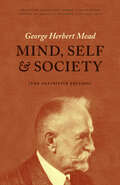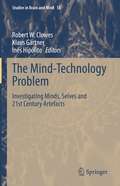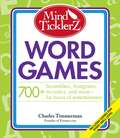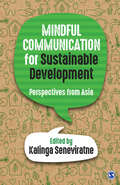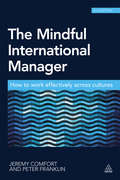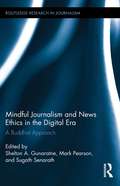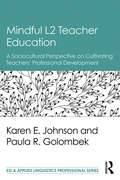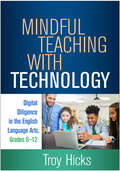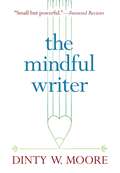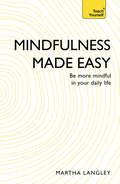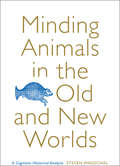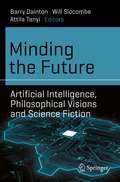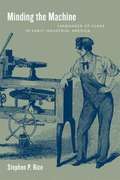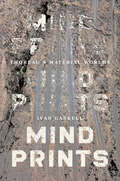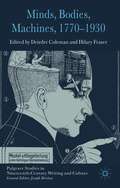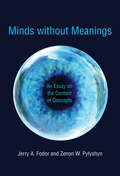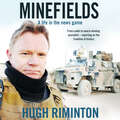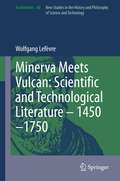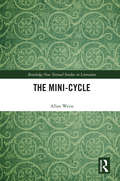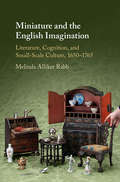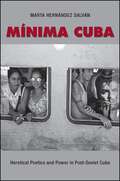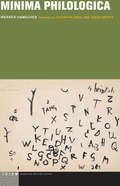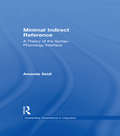- Table View
- List View
Mind, Self & Society: The Definitive Edition
by Hans Joas George Herbert Mead edited by Charles W. Morris annotated by Daniel R. HuebnerGeorge Herbert Mead is widely recognized as one of the most brilliantly original American pragmatists. Although he had a profound influence on the development of social philosophy, he published no books in his lifetime. This makes the lectures collected in Mind, Self, and Society all the more remarkable, as they offer a rare synthesis of his ideas. This collection gets to the heart of Mead’s meditations on social psychology and social philosophy. Its penetrating, conversational tone transports the reader directly into Mead’s classroom as he teases out the genesis of the self and the nature of the mind. The book captures his wry humor and shrewd reasoning, showing a man comfortable quoting Aristotle alongside Alice in Wonderland. Included in this edition are an insightful foreword from leading Mead scholar Hans Joas, a revealing set of textual notes by Dan Huebner that detail the text’s origins, and a comprehensive bibliography of Mead’s other published writings. While Mead’s lectures inspired hundreds of students, much of his brilliance has been lost to time. This new edition ensures that Mead’s ideas will carry on, inspiring a new generation of thinkers.
The Mind-Technology Problem: Investigating Minds, Selves and 21st Century Artefacts (Studies in Brain and Mind #18)
by Inês Hipólito Robert W. Clowes Klaus GärtnerThis edited book deepens the engagement between 21st century philosophy of mind and the emerging technologies which are transforming our environment. Many new technologies appear to have important implications for the human mind, the nature of our cognition, our sense of identity and even perhaps what we think human beings are. They prompt questions such as: Would an uploaded mind be 'me'? Does our reliance on smart phones, or wearable gadgets enhance or diminish the human mind? and: How does our deep reliance upon ambient artificial intelligence change the shape of the human mind? Readers will discover the best philosophical analysis of what current and near future 21st technology means for the metaphysics of mind. Important questions are addressed on matters relating to the extended mind and the distributed self. Expert authors explore the role that the ubiquitous smart phone might have in creating new forms of self-knowledge. They consider machine consciousness, brain enhancement and smart ambient technology, and what they can tell us about phenomenal consciousness. While ideas of artificial general intelligence, cognitive enhancements and the smart environment are widely commented on, serious analysis of their philosophical implications is only getting started. These contributions from top scholars are therefore very timely, and are of particular relevance to students and scholars of the philosophy of mind, philosophy of technology, computer science and psychology.
Mind Ticklerz Word Games
by Charles TimmermanWord games are a great source of fun for word lovers of all kinds. In this new series, the word wonder himself, Charles Timmerman, offers readers a diverse selection of games that is sure to entertain. Readers can work to figure out patterns, take hints from mystifying clues, and fill in the missing pieces. Featuring word games like chronograms, scramblers, and anagrams for varying abilities, this game collection challenges readers to: decode famous quotes like: "To err is human, to forgive divine." - Alexander Pope; decipher anagrams of famous names like: Hug Gores Web; name that phobia like: Apiophobia; and more! With hundreds of different word games presented to readers at once, this compilation is sure to encourage puzzlers to have fun while they try their hands at something new.
Mindful Communication for Sustainable Development: Perspectives from Asia
by Kalinga SeneviratneWritten by Asian scholars, Mindful Communication for Sustainable Development: Perspectives from Asia analyzes Asian philosophical ideas and communication theories that promote respect for cultural diversity, protection of environment, and ‘sufficiency economic’ models. It discusses how ancient Asian teachings, particularly from the Buddhist, Hindu, and Confucius schools of thought, can enrich modern-day communication needs and help to achieve the Sustainable Development Goals espoused by the United Nations. As a mindful communication revolution spreads across the world, especially in the West, this book draws attention to the danger of practicing mindfulness without its spiritual and ethical leanings. The book puts forward innovative ideas on applying traditional practices to modern digital communication. It rethinks development communication methods and how the media reports on economic, environmental, and developmental issues. It promotes a new paradigm of communication, one that is centered on both social harmony and freedom of expression. It is an essential read for development communicators and trainers.
The Mindful International Manager
by Peter Franklin Jeremy ComfortThe Mindful International Manager tackles the management situations that international managers have to handle every day. Accessible and jargon-free it explains how to clarify local vs. international roles, support and develop a team, organize and coordinate boundaries of time and distance, and win commitment toward common goals. The authors, both interculturalists, include exercises and best practice advice and the experiences and insights of practising international managers. They combine their practical approach with great depth of insight into the challenges of working and managing internationally and include the results of new research findings and cutting-edge case studies on topics such as leadership, global nomads, cultural hybridity, virtual teams, coaching and mentoring across cultures and decision-making.
Mindful Journalism and News Ethics in the Digital Era: A Buddhist Approach (Routledge Research in Journalism)
by Shelton A. Gunaratne Mark Pearson Sugath SenarathThis book aims to be the first comprehensive exposition of "mindful journalism"—drawn from core Buddhist ethical principles—as a fresh approach to journalism ethics. It suggests that Buddhist mindfulness strategies can be applied purposively in journalism to add clarity, fairness and equity to news decision-making and to offer a moral compass to journalists facing ethical dilemmas in their work. It comes at a time when ethical values in the news media are in crisis from a range of technological, commercial and social factors, and when both Buddhism and mindfulness have gained considerable acceptance in Western societies. Further, it aims to set out foundational principles to assist journalists dealing with vulnerable sources and recovering from traumatic assignments.
Mindful L2 Teacher Education: A Sociocultural Perspective on Cultivating Teachers' Professional Development (ESL & Applied Linguistics Professional Series)
by Karen E. Johnson Paula R. GolombekTaking a Vygotskian sociocultural stance, this book demonstrates the meaningful role that L2 teacher educators and L2 teacher education play in the professional development of L2 teachers through systematic, intentional, goal-directed, theorized L2 teacher education pedagogy. The message is resoundingly clear: Teacher education matters! It empirically documents the ways in which engagement in the practices of L2 teacher education shape how teachers come to think about and enact their teaching within the sociocultural contexts of their learning-to-teach experiences. Providing an insider’s look at L2 teacher education pedagogy, it offers a close up look at teacher educators who are skilled at moving L2 teachers toward more theoretically and pedagogically sound instructional practices and greater levels of professional expertise. First, the theoretical foundation and educational rationale for exploring what happens inside the practices of L2 teacher education are established. These theoretical concepts are then used to conduct microgenetic analyses of the moment-to-moment, asynchronous, and at-a-distance dialogic interactions that take place in five distinct but sometimes overlapping practices that the authors have designed, repeatedly implemented, and subsequently collected data on in their own L2 teacher education programs. Responsive mediation is positioned as the nexus of mindful L2 teacher education and proposed as a psychological tool for teacher educators to both examine and inform the ways in which they design, enact, and assess the consequences of their own L2 teacher education pedagogy.
Mindful Teaching with Technology: Digital Diligence in the English Language Arts, Grades 6-12
by Troy HicksTechnology is integral to teaching in the English language arts, whether in-person, hybrid, or remote. In this indispensable guide, Troy Hicks shows how to teach and model "digital diligence"--an alert, intentional stance that helps both teachers and students use technology productively, ethically, and responsibly. Resources and lesson ideas are presented to build adolescents' skills for protecting online privacy, minimizing digital distraction, breaking through &“filter bubbles,&” fostering civil conversations, evaluating information on the Internet, creating meaningful digital writing, and deeply engaging with multimedia texts. Dozens of websites, apps, and other tools are reviewed, with links provided at the companion website; end-of-chapter teaching points and guiding questions facilitate learning and application.
The Mindful Writer
by Dinty W. MooreGoing beyond the typical "how to write" book, The Mindful Writer illuminates the creative process: where writing and creativity originate, how mindfulness plays into work, how to cultivate good writing habits, how to grow as a writer and a person, and what it means to live a life dedicated to the craft of writing. There's not a writer alive, novice or master, who will not benefit from this book and fall in love with it. Cover to cover, this wise little book is riveting and delightful. The Mindful Writer will be a book that readers will turn to again and again as a source inspiration, guidance, and support.
Mindfulness Made Easy: Teach Yourself
by Martha LangleyMindful meditation has been around for thousands of years, and is used by top therapists as a highly effective way of overcoming anxiety, depression and a number of other emotional difficulties. It has also caught the popular imagination as a wonderful way of living in the moment and increasing one's enjoyment of life.If you are suffering from low moods, feeling anxious, or just want to learn an amazing technique for gaining control of your mind and feelings, this book is a clear and approachable introduction to the power of mindfulness.The most straightforward guide available, it gives practical step-by-step instructions on how to integrate mindful thinking into your daily life using a variety of different exercises, and shows how to use mindfulness to overcome almost anything, from depression and anxiety to over-eating and relationship difficulties.Discover how to be mindful in your daily life, and find a new, more peaceful path to walk every day.
Mindfulness Made Easy: Be more mindful in your daily life
by Martha LangleyMindful meditation has been around for thousands of years, and is used by top therapists as a highly effective way of overcoming anxiety, depression and a number of other emotional difficulties. It has also caught the popular imagination as a wonderful way of living in the moment and increasing one's enjoyment of life.If you are suffering from low moods, feeling anxious, or just want to learn an amazing technique for gaining control of your mind and feelings, this book is a clear and approachable introduction to the power of mindfulness.The most straightforward guide available, it gives practical step-by-step instructions on how to integrate mindful thinking into your daily life using a variety of different exercises, and shows how to use mindfulness to overcome almost anything, from depression and anxiety to over-eating and relationship difficulties.Discover how to be mindful in your daily life, and find a new, more peaceful path to walk every day.
Minding Animals in the Old and New Worlds: A Cognitive Historical Analysis (Toronto Iberic)
by Steven WagschalMinding Animals in the Old and New Worlds employs current research in cognitive science and the philosophy of animal cognition to explore how humans have understood non-human animals in the Iberian world, from the Middle Ages through the early modern period. Using texts from European and Indigenously-informed sources, Steven Wagschal argues that people tend to conceptualize the minds of animals in ways that reflect their own uses for the animal, the manner in which they interact with the animal, and the place in which the animal lives. Often this has little if anything to do with the actual cognitive abilities of the animal. However, occasionally early authors made surprisingly accurate assumptions about the thoughts and feelings of animals. Wagschal explores a number of ways in which culture and human cognition interact, including: the utility of anthropomorphism; the symbolic use of animals in medieval Christian texts; attempts at understanding the minds of animals in Spain’s early modern farming and hunting books; the effect of novelty on animal conceptualizations in "New World" histories, and how Cervantes navigated the forms of anthropomorphism that preceded him to create the first embodied animal minds in fiction.
Minding the Future: Artificial Intelligence, Philosophical Visions and Science Fiction (Science and Fiction)
by Barry Dainton Will Slocombe Attila TanyiBringing together literary scholars, computer scientists, ethicists, philosophers of mind, and scholars from affiliated disciplines, this collection of essays offers important and timely insights into the pasts, presents, and, above all, possible futures of Artificial Intelligence. This book covers topics such as ethics and morality, identity and selfhood, and broader issues about AI, addressing questions about the individual, social, and existential impacts of such technologies. Through the works of science fiction authors such as Isaac Asimov, Stanislaw Lem, Ann Leckie, Iain M. Banks, and Martha Wells, alongside key visual productions such as Ex Machina, Westworld, and Her, contributions illustrate how science fiction might inform potential futures as well as acting as a springboard to bring disciplinary knowledge to bear on significant developments of Artificial Intelligence. Addressing a broad, interdisciplinary audience, both expert and non-expert readers gain an in-depth understanding of the wide range of pressing issues to which Artificial Intelligence gives rise, and the ways in which science fiction narratives have been used to represent them. Using science fiction in this manner enables readers to see how even fictional worlds and imagined futures have very real impacts on how we understand these technologies. As such, readers are introduced to theoretical positions on Artificial Intelligence through fictional works as well as encouraged to reflect on the diverse aspects of Artificial Intelligence through its many philosophical, social, legal, scientific, and cultural ramifications.
Minding the Machine: Languages of Class in Early Industrial America
by Stephen Patrick RiceIn this innovative book, Stephen P. Rice offers a new understanding of class formation in America during the several decades before the Civil War. This was the period in the nation's early industrial development when travel by steamboat became commonplace, when the railroad altered concepts of space and time, and when Americans experienced the beginnings of factory production. These disorienting changes raised a host of questions about what machinery would accomplish. Would it promote equality or widen the distance between rich and poor? Among the most contentious questions were those focusing on the social consequences of mechanization: while machine enthusiasts touted the extent to which machines would free workers from toil, others pointed out that people needed to tend machines, and that that work was fundamentally degrading and exploitative. Minding the Machine shows how members of a new middle class laid claim to their social authority and minimized the potential for class conflict by playing out class relations on less contested social and technical terrains. As they did so, they defined relations between shopowners--and the overseers, foremen, or managers they employed--and wage workers as analogous to relations between head and hand, between mind and body, and between human and machine. Rice presents fascinating discussions of the mechanics' institute movement, the manual labor school movement, popular physiology reformers, and efforts to solve the seemingly intractable problem of steam boiler explosions. His eloquent narrative demonstrates that class is as much about the comprehension of social relations as it is about the making of social relations, and that class formation needs to be understood not only as a social struggle but as a conceptual struggle.
Mindprints: Thoreau's Material Worlds
by Ivan GaskellA rediscovery of Thoreau’s interactions with everyday objects and how they shaped his thought. Though we may associate Henry David Thoreau with ascetic renunciation, he accumulated a variety of tools, art, and natural specimens throughout his life as a homebuilder, surveyor, and collector. In some of these objects, particularly Indigenous artifacts, Thoreau perceived the presence of their original makers, and he called such objects “mindprints.” Thoreau believed that these collections could teach him how his experience, his world, fit into the wider, more diverse (even incoherent) assemblage of other worlds created and re-created by other beings every day. In this book, Ivan Gaskell explores how a profound environmental aesthetics developed from this insight and shaped Thoreau’s broader thought.
Minds, Bodies, Machines, 1770–1930
by Deirdre Coleman Hilary FraserIt is during the nineteenth-century, the age of machinery, that we begin to witness a sustained exploration of the literal and discursive entanglements of minds, bodies, machines. This book explores the impact of technology upon conceptions of language, consciousness, human cognition, and the boundaries between materialist and esoteric sciences.
Minds without Meanings: An Essay on the Content of Concepts (The\mit Press Ser.)
by Jerry A. Fodor Zenon W. PylyshynTwo prominent thinkers argue for the possibility of a theory of concepts that takes reference to be concepts' sole semantic property.In cognitive science, conceptual content is frequently understood as the “meaning” of a mental representation. This position raises largely empirical questions about what concepts are, what form they take in mental processes, and how they connect to the world they are about. In Minds without Meaning, Jerry Fodor and Zenon Pylyshyn review some of the proposals put forward to answer these questions and find that none of them is remotely defensible.Fodor and Pylyshyn determine that all of these proposals share a commitment to a two-factor theory of conceptual content, which holds that the content of a concept consists of its sense together with its reference. Fodor and Pylyshyn argue instead that there is no conclusive case against the possibility of a theory of concepts that takes reference as their sole semantic property. Such a theory, if correct, would provide for the naturalistic account of content that cognitive science lacks—and badly needs. Fodor and Pylyshyn offer a sketch of how this theory might be developed into an account of perceptual reference that is broadly compatible with empirical findings and with the view that the mental processes effecting perceptual reference are largely preconceptual, modular, and encapsulated.
Minefields: A life in the news game - the bestselling memoir of Australia's legendary foreign correspondent
by Hugh RimintonMinefields is a compelling exploration of a foreign correspondent's life - proof of Hugh's belief that 'if you go looking for trouble, you'll probably find it'.Over nearly forty years as a journalist and foreign correspondent, Hugh Riminton has been shot at, blown up, threatened with deportation and thrown in jail. He has reported from nearly fifty countries, witnessed massacres in Africa, wars and conflicts on four continents, and every kind of natural disaster.It has been an extraordinary life. From a small-town teenager with a drinking problem, cleaning rat cages for a living, to a multi-award-winning international journalist reporting to an audience of 300 million people, Hugh has been a frontline witness to our times. From genocide in Africa to the Indian Ocean tsunami, from wars in Iraq and Afghanistan to slave-buying in Sudan, Hugh has seen the best and worst of human behaviour. In Australia, he has covered political dramas, witnessed the Port Arthur massacre and the Thredbo disaster and broken a major national scandal. His work helped force half a dozen government inquiries. His story is entertaining, deeply personal and quietly wise.'An impressive career. His story is a triumph of substance over style.' Sydney Morning Herald'Hugh is an icon of Australian journalism' Michael Ware, former Iraq correspondent for TIME and CNN
Minerva Meets Vulcan: Scientific and Technological Literature – 1450–1750 (Archimedes #60)
by Wolfgang LefèvreThis book offers a comprehensive study and account of the co-evolution of technological and scientific literature in the early modern period (1450-1750). It examines the various relationships of these literatures in six areas of knowledge – Architecture, Chemistry, Gunnery, Mechanical Engineering, Mining, and Practical Mathematics – which represent the main types of advanced technological and scientific knowledge of the era. These six fields of technologically advanced knowledge and their interrelations and interactions with learned knowledge are investigated and discussed through a specific lens: by focusing on the technological literature. Among present-day historians of science, it hardly remains controversial that contact and exchange between educated and practical knowledge played a significant role in the development of the natural sciences and technology in early modern Europe. Several paths for such exchange arose from the late Middle Ages onward due to the formation of an economy of knowledge that fostered contacts and exchange between the two worlds. How can this development be adequately described and how, on the basis of such a description, can the significance of this process for the early modern history of knowledge in the West be assessed? These are the overarching questions this book tries to answer. There exists a considerable amount of literature concerning several stations and events in the course of this long development process as well as its various aspects. As meritorious and indispensable as many of these studies are, none of them tried to portray this process as a whole with its most essential branches. What is more, many of them implicitly or explicitly took physics as a model of science, and thus highlighted mechanics and mechanical engineering as the model of all interrelations of practical and learned knowledge. By contrast, this book aims at a more complete portrait of the early modern interrelations and interactions between learned and practical knowledge. It tries to convey a new idea of the variety and disunity of these relations by discussing and comparing altogether six widely different fields of knowledge and practice. The targeted audience of this book is first of all the historians of science and technology. As one of the peer reviewers suggested – the book could very well become a textbook used for teaching the history of science and technology at universities. Furthermore, since the book addresses fundamental aspects of the significance emergence and development of modern science has for the self-image of the West, it can be expected that it will attract the attention and interest of a wider readership than professional historians.
The Mini-Cycle (Routledge New Textual Studies in Literature)
by Allan WeissWhile scholars have been studying the short story cycle for some time now, this book discusses a form that has never before been identified and named, let alone analyzed: the mini-cycle. A mini-cycle is a short story cycle made up, in most cases, of only two or three stories. This study looks at mini-cycles spanning the period from Anton Chekhov’s "little trilogy" (1898) to the "Alphinland" stories in Margaret Atwood’s Stone Mattress (2014), including texts by such authors as Stephen Leacock, Alice Munro, Robert Olen Butler, and Clark Blaise. Consideration is also given to marginal examples, like Sherwood Anderson’s "Godliness—A Tale in Four Parts" (1919), which can be seen as one story or four distinct texts unified under one title, and to what is called the "exploded" mini-cycle: one whose component stories are published with intervening stories between them rather than consecutively. For each mini-cycle, the analysis is based on close reading of both the linking elements—character, imagery, symbolism, and so forth—and the rhetorical and aesthetic effects of the mini-cycle’s being made up of distinct stories rather than constructed as one long narrative.
Miniature and the English Imagination: Literature, Cognition, and Small-Scale Culture, 1650–1765
by Melinda Alliker RabbFocusing on the phenomenon of miniaturization in material culture, literature, and theories of cognition, this study examines the appeal and function of the small-scale during the period from 1650 to 1765. Drawing on three interconnected areas of scholarship, Melinda Alliker Rabb analyzes the human capacity to supplement direct experience of the world through representation, in order to gain knowledge of that world and to attempt control over it. Assessing two kinds of miniature - the real and the imagined - allows rethinking of works by Swift, Pope, Gay, Johnson, Sterne, and others, and shows how the fictional miniature can correspond meaningfully to the world of things. The phenomenon of scaling down objects as various as teapots, bureaus, globes, buckets, spoons, battlefields, and diving bells, has a relationship to large-scale events as various as financial revolution, globalization, scientific discovery, war and other events that challenge old modes of representation and demand new ones.
Miniature Metropolis
by Andreas HuyssenAndreas Huyssen explores the history and theory of metropolitan miniatures--short prose pieces about urban life written for European newspapers. His fine-grained readings open vistas into German critical theory and the visual arts, revealing the miniature to be one of the few genuinely innovative modes of spatialized writing created by modernism.
Minima Cuba: Heretical Poetics and Power in Post-Soviet Cuba (SUNY series in Latin American and Iberian Thought and Culture)
by Marta Hernández Salván2016 CHOICE Outstanding Academic TitleMínima Cuba analyzes the reconfiguration of aesthetics and power during the Cuban postrevolutionary transition (1989 to 2005, the conclusion of the "Special Period"). It explores the marginal cultural production on the island by the first generation of intellectuals born during the Revolution. The author studies the work of postrevolutionary poets and essayists Antonio José Ponte, Rolando Sánchez Mejías, and Iván de la Nuez, among others. In their writing we find the exhaustion of the allegorical and melancholic rhetoric of the Cuban Revolution, and the poetics of irony developed in the current biopolitical era. The book will appeal to anyone interested in contemporary literary and cultural studies, poetics, and film studies in Latin America and the Caribbean.
Minima Philologica (Idiom: Inventing Writing Theory)
by Werner HamacherMinima Philologica brings together two essays by Werner Hamacher that are meant to revitalize philology as a practice beyond its restriction to the restoration of linguistic data and their meanings. In these two texts, “95 Theses on Philology” and “For—Philology,” Hamacher propounds a notion of generalized philology that is equivalent to the real production of linguistic utterances, and indeed utterances not limited to predicative or even discursive statements. Philology, in speaking for language where no clear and distinct language is given, exhibits and exposes the structure of language in general. The first text, “95 Theses on Philology,” challenges academic philology as well as other disciplines across the humanities and sciences that “use” language, assuming it to be a given entity and not an event. The theses develop what Hamacher calls the “idea of philology” by describing the constitution of its objects, its relation to knowledge, its suspension of consciousness, and its freedom for what remains always still to be said.In “For—Philology,” both speaking and writing, Hamacher argues, follow, discursively and non-discursively, the desire for language. Desire—philía—is the insatiable affect that drives the movement between utterances toward the next and the one after that. Desiring language—logos—means to respond to an alien utterance that precedes you, ignorant about where the path will lead, accepting loss and uncertainty, thinking in and through language and the lack of it, exceeding, returning, responding to others, cutting into and off what is to be said. In arguing this, Hamacher responds, directly or obliquely, to other philological thinkers such as Plato and Schlegel, Nietzsche, Benjamin, and Heidegger, as well as to poets such as Rene Char, Francis Ponge, Paul Celan, and Friedrich Holderlin. Taken together, the essays of Minima Philologica constitute a manifesto for a new understanding of linguistic existence that breaks new ways of attending to language and those who live by it.
Minimal Indirect Reference: A Theory of the Syntax-Phonology Interface (Outstanding Dissertations in Linguistics)
by Amanda SeidlThis book investigates the nature of the relationship between phonology and syntax and proposes a theory of Minimal Indirect Reference that solves many classic problems relating to the topic.
